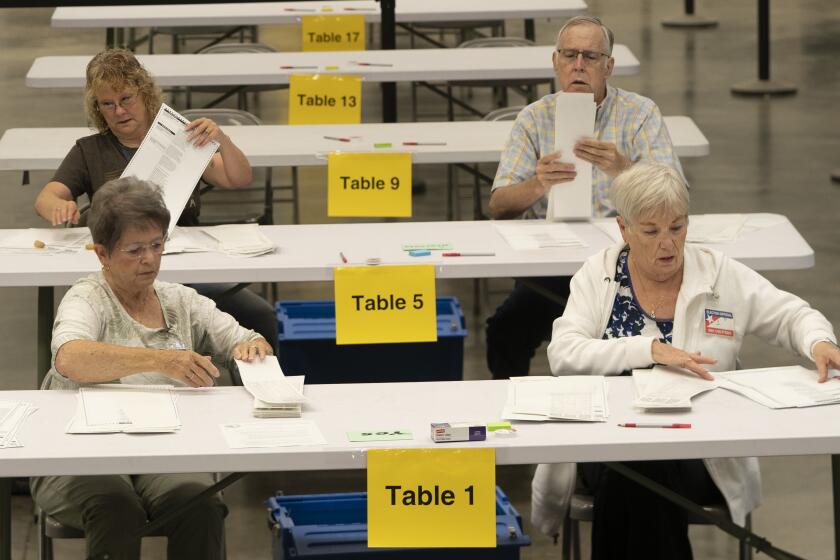Kansas can’t enforce new abortion pills law or make patients wait 24 hours, judge rules

- Share via
TOPEKA, Kan. — A Kansas judge on Monday put a new state law on medication abortions on hold and blocked older restrictions that for years have spelled out what providers must tell patients and forced patients to wait 24 hours to end their pregnancies.
The ruling was another big victory for abortion rights advocates in Kansas, where a statewide vote in August 2022 decisively confirmed protections for abortion access under the state constitution. District Judge K. Christopher Jayaram’s order suspends some restrictions that have been in effect for years. The waiting period had been in place since 1997.
“The Court has great respect for the deeply held beliefs on either side of this contentious issue,” Jayaram wrote in his 92-page order. “Nevertheless, the State’s capacity to legislate pursuant to its own moral scruples is necessarily curbed by the Kansas Constitution and its Bill of Rights.”
Jayaram’s order is set to remain in effect through the trial set for the end of June 2024 for a lawsuit filed by abortion providers, against state officials who would enforce abortion restrictions. The providers filed their case in Johnson County in the Kansas City area, home to two clinics that provide abortions.
Voters rejected a measure that would have let GOP lawmakers restrict or outlaw abortion. Can abortion rights activists replicate the win beyond Kansas?
The legal battle highlights the importance of state courts in attempts to preserve access a little more than a year after the U.S. Supreme Court’s decision in Dobbs v. Jackson ended protections under the U.S. Constitution and allowed states to ban abortion. In August, a judge in Texas ruled that the state’s ban was too restrictive, and the Utah Supreme Court heard arguments on whether it should lift a hold on a state law there banning most abortions.
Kansas has been an outlier on abortion among states with Republican-controlled legislatures. The state Supreme Court declared in 2019 that the Kansas Constitution protects a right to bodily autonomy and therefore access to abortion as a “fundamental” right. GOP lawmakers proposed an amendment to the state constitution to declare that it doesn’t grant a right to abortion — and in the August 2022 vote, that ballot initiative lost by a wide margin, upholding abortion rights.
Republican lawmakers nevertheless argued this year that “reasonable restrictions” are still fair game. A law that took effect July 1 required abortion providers to tell their patients that a medication abortion can be stopped using a regimen touted by antiabortion groups. The state agreed not to enforce it until another ruling from Jayaram.
In an August hearing, Jayaram said his reading of medical literature showed that the regimen’s effectiveness is not confirmed by any valid studies. Major medical groups consider the regimen ineffective and potentially unsafe.
The lawsuit alleges that Kansas has a ‘Biased Counseling Scheme’ meant to discourage patients from having abortions and to stigmatize those who do.
Providers also attacked existing laws enacted by GOP lawmakers as a way to ensure patients are properly informed before undergoing an abortion. Patients not only must receive medical information 24 hours before the procedure, but that information must also be in writing and in a specific size and style of type. It must include statements drafted by abortion opponents about fetal development and purported abortion risks that major medical groups consider debunked, false or misleading.
“I’m struggling to see why we’re singling out one specific provider type and one specific service,” Jayaram told the state’s attorneys from the bench during the recent hearing.
Attorneys for the providers have argued that the growing layers of restrictions created a biased counseling scheme designed to discourage abortion. Kansas doesn’t ban most abortions until the 22nd week of pregnancy.
The providers also said challenging older restrictions became more compelling as other states banned abortion and out-of-state residents flooded them with requests for appointments. Kansas saw a 57% increase in abortions in 2022, according to state health department data.
Election officials say a decisive statewide vote in favor of abortion rights in Kansas has been confirmed with a partial hand recount.
“We feel compelled to get patients who are going to get back in the car for 15 hours medically accurate information because we know they’re scared to talk to providers at home,” Emily Wales, CEO of Planned Parenthood Great Plains, told reporters after a recent court hearing.
Abortion opponents argued repeatedly before the August 2022 vote that without a change in the state constitution, all existing abortion restrictions could be at risk. The state Supreme Court is reviewing a 2015 law banning the most common second-trimester procedure and a 2011 law imposing tougher health and safety requirements only for abortion providers. Neither has been enforced because of the litigation.
Attorneys for the state and the antiabortion Alliance for Defending Freedom argue that in suing the state this year, providers are working against their patients’ interest in having as much information as possible.
“Simply giving a woman information — just like these abortion providers have done for 26 years — that’s not impairing a woman’s right to choose to have an abortion one way or the other,” Denise Harle, an alliance attorney, said following the court hearing earlier this month.
More to Read
Sign up for Essential California
The most important California stories and recommendations in your inbox every morning.
You may occasionally receive promotional content from the Los Angeles Times.















